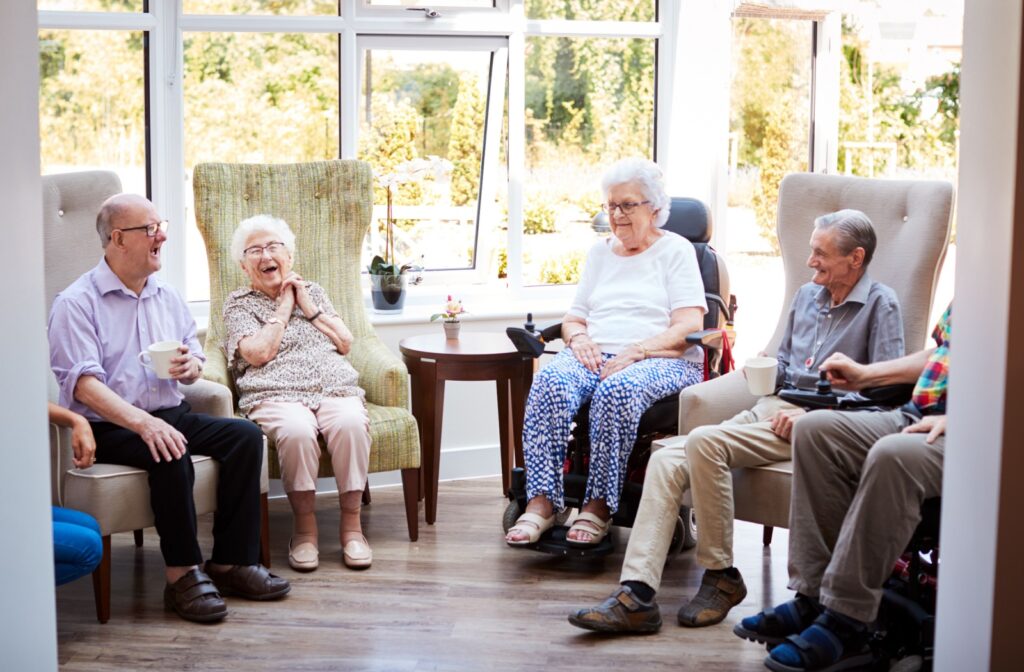Transitioning between levels of care in senior living doesn’t always have a cut-and-dry answer. Some signs it’s time to consider a move from assisted living to memory care could include:
- An increase in wandering
- Increased anxiety or agitation
- Changes in eating habits
- Increased care demands
- Social isolation
The individual needs and situation of each person are typically the ultimate indicators of when it’s time to transition to a new level of care. A senior living community that offers different levels of care may have the resources to provide a more gradual transition between assisted living and memory care to meet different needs as they appear.
What Is Assisted Living?
Assisted living is a type of senior living community where older adults receive assistance with activities of daily living (ADLs) and access to supportive services. It can provide a comfortable and safe environment for individuals who may need help with tasks like bathing, dressing, medication management, and meal preparation. Assisted living can also promote independence while offering a range of amenities and social opportunities to enhance residents’ quality of life.
Not all assisted living communities are the same, though. Some may offer services and amenities like salons or spas, while others have a more modest approach with a focus on surrounding amenities like walking trails or nature. It’s important to tour each community when deciding which to choose so you can confirm it meets your needs and your family’s needs.
A common misconception about assisted living is that it’s a one-size-fits-all solution for seniors. But each person’s needs and preferences are unique. Some types of care may be better suited for different people. For example, some seniors may prefer a community that offers extensive medical care while providing social opportunities, while others may have more specific needs from age-related changes like dementia and other cognitive challenges.
What Is Memory Care?
Memory care communities share some similarities with assisted living but they’re fundamentally different in their focus of care. A memory care community caters to the unique needs of residents who experience memory and cognitive function challenges. A senior with dementia may want or need a higher level of care than what a traditional assisted living community provides.
The staff in a memory care community typically have special training to help them understand and meet the needs of residents with memory impairments. They may also have training that allows them to identify and manage difficult behaviors that can accompany dementia or its related conditions.
A key benefit of memory care is that it can offer seniors a safe and secure environment. The grounds are specifically designed with resident safety in mind, with many memory care communities offering locked and secure entrances to prevent wandering.
Additionally, a memory care community often features extra safety precautions such as motion sensors and emergency call buttons. This helps ensure residents can receive urgent assistance if they need it.
Transitioning from Assisted Living to Memory Care
Choosing when to move from assisted living to memory care isn’t always an easy or obvious decision. However, while there are several key factors to look for, a person’s individual needs are often the ultimate deciding factor.
Increased Wandering or Confusion
If you notice a loved one wandering more or becoming confused about their surroundings, it may be a sign that they could benefit from more specialized care. Memory care can help those who experience wandering and confusion enjoy life in a safe, secure environment.
Increased Anxiety & Agitation
Sudden outbursts of anger or crying might indicate that your loved one is feeling overwhelmed in their current living situation. In memory care, staff are often trained to help residents manage their emotions, provide calming techniques to help reduce anxiety and agitation, and help people experiencing memory challenges get the support they may need to live happily.
Changes in Eating Habits
A person’s ability to feed themselves properly can be affected as cognitive decline progresses. If you observe a loved one losing weight, refusing to eat, or forgetting to eat, it may be time to consider memory care. The staff in memory care communities can assist with maintaining a healthy diet.
It’s important to involve your healthcare provider in decisions related to changes in eating habits and weight loss to confirm no other underlying health issues are causing these changes.
Increased Care Demands
Assisted living offers a level of support that may not be sufficient for someone with advanced dementia. As cognitive challenges progress, individuals may require more assistance with personal care tasks such as bathing and grooming. Memory care can provide the necessary support for those who need extra help with daily living activities.
Social Isolation
Loneliness and social isolation are common challenges faced by those with dementia. Memory care communities often offer a variety of social activities, along with one-on-one interactions with staff trained in memory care. These social opportunities can help older adults maintain a sense of independence while connecting with others in a safe and supportive environment.

Find a Community that Supports a Smooth Transition
Dementia and its related conditions can certainly complicate aging, especially when it comes to getting the proper care and support. But that’s where senior living communities that specialize in offering memory care services can make a difference in your life.Call us today at Round Lake Senior Living if you or your loved one is considering senior living in Arden Hills. Our compassionate team can provide a community tour so you and your loved one know what to expect when you call our community home.



